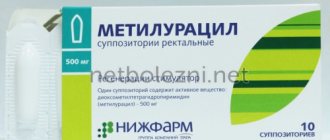Osteoarthritis of the spine and peripheral joints is a common problem that was previously encountered only by older people. Recently, the disease has begun to affect young people aged 25-30 years. Osteoarthritis brings significant discomfort and is accompanied by pain. In the absence of proper treatment, it causes significant restrictions in the functioning of the musculoskeletal system, impairs joint mobility, reduces motor activity and quality of life. To protect the musculoskeletal system, chondroprotective and chondrostimulating drugs are recommended, which include the drug Artra®. The drug not only effectively fights the disease, but also eliminates the causes that led to the disease.
Component composition of Arthra and its pharmacological action
The instructions contain the following components of the medication:
- chondroitin;
- glucosamine;
- MCC;
- octadectanoic acid;
- magnesium stearate;
- calcium hydrogen phosphate;
- croscarmellose sodium.
The medicine is produced in tablets with a protective film coating, packaged in polyethylene jars. The packaging additionally contains instructions from the manufacturer.
Artra is a regulator of regenerative processes:
- Exogenous glucosamine - enhances the production of cartilage elements, protects them from various damage by chemicals. The element is used for the production of glycosaminoglycans in the body and has an anti-inflammatory spectrum of action.
- Chondroitin is a secondary nutrient for cartilage. With its help, the production of hyaluronan and proteiglycans is activated, and the aggressive effects of free radicals are suppressed. The ingredient acts as a stimulator of repair mechanisms in cartilage, reduces the activity of enzymes responsible for the breakdown of cartilage tissue. The element provides the necessary indicators of synovial viscosity.
If the patient has osteoarthritis and takes the drug, the symptoms of the pathology are relieved and the need for NSAID therapy is reduced.
Stimulates the regeneration of cartilage tissue
The main part of synovial fluid is chondroitin sulfate. The component is produced by the human body, playing an important role in the normal functioning of the skeletal system. But as the disease progresses, the amount of chondroitin in the joint fluid is greatly reduced. In the absence of outside help, dystrophic changes in the joints become irreversible. The combination drug Artra® contains a sufficient amount of substances necessary for:
- regulation of metabolic processes in cartilage cells;
- normalization of calcium deposition in bones;
- synthesis of hyaluronic acid.
Once in the body when using the drug, chondroitin sulfate quickly exhibits an active effect, slowing down the processes of destruction of cartilage tissue, preventing excessive loss of calcium from joints and bone tissues.
Chondroitin helps strengthen ligaments and tendons. The component has a strong anti-inflammatory and analgesic effect. The substance activates metabolism, inhibiting the destructive effects of enzymes on joints. As a result of taking Artra®, restoration and strengthening of cartilage and tendons and bone tissue regeneration are observed. Under the influence of chondroitin, the functional mobility of the joint capsule increases. Acting as one of the main components of synovial fluid, chondroitin sulfate improves its properties, inhibiting degeneration processes, restoring the normal cartilaginous surface of the joints.
Adverse reactions
Therapeutic procedures can cause non-standard responses in the body. Glucosamine, which is part of Arthra, causes dyspeptic disorders, active gas formation, discomfort in the epigastric region, diarrhea or constipation.
Secondary side effects include:
- attacks of dizziness;
- insomnia and drowsiness during the day;
- cephalgia, swelling in peripheral tissues;
- allergic reactions with redness of certain areas of the skin, dermatological rash, obsessive itching;
- accelerated heartbeat.
In some cases, chondroitin causes the development of individual intolerance to the drug. If non-standard symptoms appear, the patient should consult a doctor and describe in detail the changes in the condition and the main manifestations.
Protects joints from negative effects
The second active ingredient in the drug, the combined chondroprotector Artra®, is glucosamine hydrochloride, which promotes the resumption of enzymatic processes in the joint, prevents the development of pathological changes in the joints, restores motor function and increases the pain threshold.
As a result of taking the drug, other functions of glucosamine can be traced. The substance protects cartilage tissue from the negative effects of chemicals that enter the body with other drugs. For serious diseases of the spine and joints, doctors prescribe various medications to relieve pain and swelling, but many of them have side effects in the form of decreased performance of cartilage. Glucosamine protects cartilage tissue from the negative effects of chemicals.
With a lack of glucosamine, even under normal conditions, the synthesis of chondroitin in the body is significantly reduced. A deficiency of the substance manifests itself in the form of a characteristic crunch in the joint area, deformation of cartilage, and activation of inflammatory processes. As a result of taking Artra®, normal synthesis of chondroitin is ensured, and there is an analgesic and anti-inflammatory effect on the joints.
The combination of chondroitin sulfate and glucosamine allows you to achieve a complex effect for joint diseases. Pain is reduced, inflammatory processes are slowed down, so it is possible to reduce the amount of other anti-inflammatory drugs or completely stop taking them. Slowing down dystrophic and degenerative processes in bone tissue, joints and cartilage gradually leads to a noticeable improvement in their condition.
To achieve the maximum effect from the drug, it is necessary to take the medicine correctly, in a course. The instructions for Arthra® contain a detailed diagram of the use of the drug.
Basics of Arthra Therapy
The instructions emphasize that in the first 21 days from the start of treatment, the drug is taken one tablet twice a day. Subsequent treatments are reduced to one tablet daily and can last several months.
The medication is used to treat patients over 15 years of age; the therapeutic effect obtained and the absorption rates of Arthra components are not related to the time of day or meals. Obtaining sustainable therapeutic results requires prolonged manipulation over one half year.
As a secondary drug to improve the condition of the musculoskeletal region, patients are prescribed Arthro-Active. The daily dosage of capsules varies from 4 to 6 pieces. Treatment lasts 2-4 weeks, followed by a two-week break and resumption of manipulations.
The abstract does not indicate any reported cases of accidental drug overdose. In theory, the drug can provoke adverse reactions when taking a large number of tablets. In this case, the patient will be prescribed symptomatic therapy.
Manufacturer's instructions
The abstract draws attention to certain nuances:
- combination with anticoagulants and antiplatelet agents increases their spectrum of action;
- combination with tetracyclines – activates their absorption;
- taken together with penicillins reduces their effectiveness.
The drug should not be used simultaneously with glucocorticosteroids or anti-inflammatory drugs.
If during therapeutic procedures the patient experiences undesirable reactions from the digestive tract, then the dosage needs to be adjusted. The doctor should reduce the number of tablets. Lack of improvement requires discontinuation of the medication.
Artra
Artra (chondroitin sulfate + glucosamine hydrochloride) is a combined drug from the group of chondroprotectors that promotes the restoration of cartilage tissue. Its main area of application is osteoarthritis of the spine and peripheral joints. The problem of treating osteoarthritis has not lost its relevance for many years. The reason for this is the increasing prevalence of this disease and the significant decrease in quality of life that is noted as it develops. In addition to this, osteoarthritis is often accompanied by diseases of the cardiovascular system and respiratory tract, which leads to a reduction in life expectancy. The basis of osteoarthritis is not only the aging of cartilage, as was previously believed, but also pathological changes in all articular structures - the subchondral bone plate, ligamentous apparatus, synovial membrane, capsule, periarticular muscles. Signs of cartilage aging are an increase in the content of polymeric sulfated glycosaminoglycans with a simultaneous decrease in the level of chondroitin sulfate. The pathological process in osteoarthritis is characterized by a significantly greater variety of symptoms, however, it has much in common with the process of natural aging of cartilage. The treatment tactics for osteoarthritis have undergone major changes in recent years: today it is not only the use of analgesics, but also long-term pharmacotherapy with chondroprotectors, aimed at normalizing the functions of joint tissues and structures, which in the long term means more reliable and natural pain relief. The most effective are combined chondroprotectors containing chondroitin sulfate and glucosamine hydrochloride - natural components of cartilage tissue. One such medicine is Artra from the American pharmaceutical company UNIPHARM. Artra has a proven positive effect on metabolic processes inside cartilage, consisting in suppressing catabolism and stimulating anabolism. The drug reduces the severity of pain and inhibits the development of osteoarthritis.
Its components participate in the formation of connective tissue, preventing the destruction of cartilage and promoting the restoration of damaged areas. Glucosamine stimulates the production of cartilaginous intercellular substance, provides its protection from non-steroidal anti-inflammatory drugs, glucocorticoids and other damaging factors, and has an anti-inflammatory effect. Chondroitin sulfate is the raw material for the formation of the intercellular substance of cartilage, stimulates the synthesis of type 2 collagen and proteoglycans, protects cartilage from the aggressive action of hyaluronidase, elastase and other enzymes. Relieves the symptoms of osteoarthritis and reduces the need for non-steroidal anti-inflammatory drugs, thereby reducing the pharmacological burden on the body and minimizing the risk of side effects. The effectiveness of the drug Artra has been confirmed in several randomized clinical trials, one of which was conducted in our country on the basis of the First Moscow State Medical University named after. THEM. Sechenov and the Institute of Rheumatology of the Russian Academy of Medical Sciences. The study involved patients suffering from stage II–III osteoarthritis of the knee joints with severe pain. The duration of the study was six months. The control group of patients received only non-steroidal anti-inflammatory drugs. The results of the study confirmed the pronounced beneficial effect of Artra in 93% of cases, with a significant difference in effectiveness from NSAID therapy for the better. A noticeable effect from taking Artra begins to be observed at 3-4 months of drug therapy, and its peak develops at 6 months of treatment. The drug is well tolerated (which is especially important during long-term therapy) and has a minimum of unwanted side reactions (mild disorders of the digestive tract, rare allergic reactions). Cases of overdose have not been described in the medical literature. Artra has little interaction with other drugs, with the exception of anticoagulants and antiplatelet agents (when taken together, a potentiation of the effect of the latter is observed).
Analogs
Non-standard manifestations of treatment require a revision of the prescribed regimen. The list of popular analogues of Arthra is presented:
- Arthrom MSM Forte, KONDROnova Tazan, Teraflex;
- Chondroflex, Chondroglyuksid, Adgelon;
- Alflutop, Biartrin, Gamma-plant;
- Discus Compositum, Synovial, Traumeel S;
- Rumalaya, Tselyu T, SINOART, Chondrotek Forte.
Substitutes are selected by the attending physician after undergoing a repeated laboratory diagnostic examination. The cost of analogues starts from 295 rubles, which allows you to choose an inexpensive and effective product.

